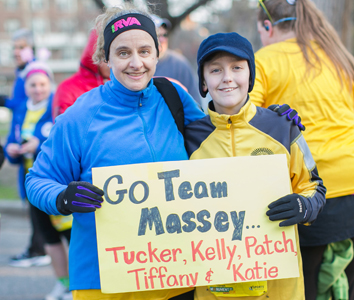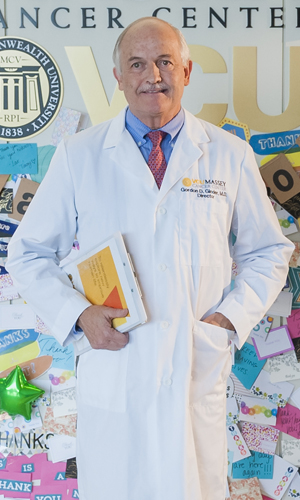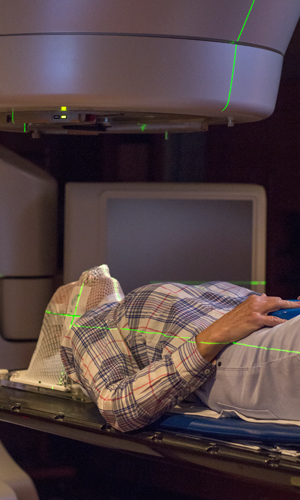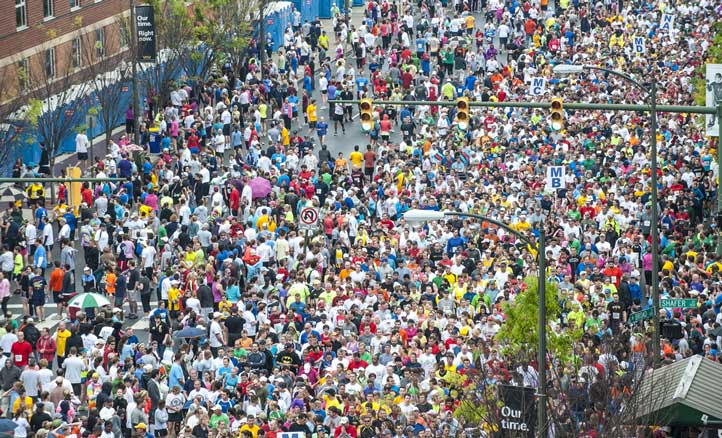Crowd funding
About 30,000 people run the Ukrop’s Monument Avenue 10k every year, and many participants choose to run in support of the VCU Massey Cancer Center. But how does the money they raise actually affect cancer research? As we look forward to the 18th annual race April 1, we pick two people out of the crowd to show how a runner can impact the race toward a cure.
By Emma Coates
THE RUNNER

This April, Kelly Durham, a 48-year-old training and development program specialist at Markel Corp., will mark a decade of running in the annual Ukrop’s Monument Avenue 10k. Over the years, her efforts and those of her supportive family have raised more than $70,000 for Virginia Commonwealth University’s Massey Cancer Center. In 2016 alone, Durham raised $20,067 and became Massey’s top individual fundraiser for the second consecutive year.
“I started running the 10k when my father-in-law was ill and diagnosed with skin cancer. It was a huge boost in his spirits as he was going through treatment, and it was a way for us to feel like we were doing something, to find some positivity during our difficult time.
“Sadly, he passed away in 2010. After that, we continued to fundraise in his memory and tap into his network of friends and family to support us.
“A couple of years later, we decided to change things up and support some people we knew who were still here and going through cancer treatment. We dedicated each mile of the race to a different person. As I was running the race with my son, literally as we passed each mile marker we were going, ‘OK, this one’s for Sophia, keep on going, and this one’s for Drew.’ It was very emotional, in a really good way.
“This past year, my family was stricken again, and my aunt Jeannie was diagnosed with a very rare form of leukemia. So this year, we are running for her. People are so supportive when they hear a personal story. So many people can relate to it because they have friends or family who have also been struggling with cancer or who have been lost. Everybody has a story.
“We do the majority of fundraising by writing letters. I do send emails and use social media, but honestly I don’t have a lot of success that way. We include pictures with the letters, either of the people we’re honoring or of us running from the previous year. The pictures are worth a thousand words.
“My husband, he’s my director of gratitude – we write personal thank-you cards or call people, acknowledging that we’ve received their donations and updating them on what we’re doing. My oldest son, Tucker, runs the race with me every year, and he’s really helped me with fundraising. My youngest son, Patrick, has run the kids’ race twice and should be ready to try the 10k for the first time this year.
“I do keep track of my fundraising totals because it’s very motivating. We have capped out at over $70,000. You might think that one person can’t make a difference, but they can.”
THE NUMBERS
For 12 years, Massey has served as charitable partner of the 10k, raising more than $5 million thanks to the runners and walkers who choose to fundraise as part of their participation in the race.
Each runner is encouraged to meet a fundraising goal of $100.
Each year, 30,000 people run the race. If they all ran for Massey and raised $100 each, they would raise $3 million.
There are 41,000 people with cancer in Virginia (ACS, 2015).
In 2016, Massey Cancer Center’s peer-to-peer fundraising campaign, which culminates with the Ukrop’s Monument Avenue 10k, raised $403,420. Proceeds from 10k registration alone raised $24,000.
Every dollar raised or donated goes directly (and immediately) into Massey’s unrestricted fund, giving Gordon D. Ginder, M.D., director of Massey Cancer Center, the ability to fund the most promising research and clinical trials available at Massey, which benefits patients here in Richmond, Virginia, and beyond.
THE DOCTOR

“Unrestricted funds from the Ukrop’s Monument Avenue 10k partnership and other fundraisers are essential to our ability to pursue the most promising new treatments that will ultimately reduce death and suffering caused by cancer. The flexibility to pursue an innovative scientific concept, invest in the recruitment of a leading researcher or test technology that could move a patient’s care forward is crucial. I am immensely grateful for the generous support of a community that chooses to not only invest their own time and money but also passionately share our mission in a way that creates a powerful ripple effect.”
Gordon D. Ginder, M.D., Lipman Chair in Oncology and director, Massey Cancer Center
THE AREAS OF NEED
Clinical trial funding: Gives more patients access to the hope of a clinical trial.
Recruitment and retention: Builds the right recruitment and retention packages for talented researchers.
Pilot projects: Provides researchers with the opportunity to develop concepts to the point where they are eligible to receive external funding.
Shared resources: Ensures researchers have access to the right resources at the right time.
Bridge funding: Supplements grant funding to keep research moving when funding lapses.
Investing in these areas of need ensures that the latest treatment advances, backed by the latest research breakthroughs, are delivered to patients as quickly as possible.
THE PATIENT

In 2006, Bromby Earle, a 69-year-old real estate agent, underwent surgery, radiation and chemotherapy at Massey Cancer Center to remove a tumor on her neck. When her type of cancer, the rare and low-grade acinic cell carcinoma, was detected again in 2013, she had surgery to remove the affected tissue. She got the all-clear, but in summer 2016, doctors determined that she would have to undergo radiation and chemotherapy again. She began her treatment Nov. 7, 2016, about two weeks after this interview.
“The area where this cancer is located is in an inoperable place. Nine years ago, I was told that the radiation I received was it – no more. But now, it is possible. With precision medicine, they can target and deliver the radiation around and not through damaged tissue. What a relief.
“I know I can do this. Renewed hope for a full life is a reality, and I know every day brings new discoveries in this battle against cancer. If I can have five more years, there will be something else out there for me. This new immunotherapy is quite exciting. Perhaps, in the future, it will be available for my type of cancer.
“I’m anxious, and I’m ready to get started. I feel so very confident in all of the doctors who care for me at Massey. Me and Dr. [Laurence] DiNardo [M.D., FACS; otolaryngology] and Dr. [Shiyu] Song [M.D., Ph.D.; radiation oncology] go back almost 10 years. These doctors are so dedicated to fighting cancer, finding the cure and taking care of their patients. I have utmost faith that Dr. Song will drive that radiation to the exact spot that will, once and for all, kill these cancer cells.
“I’m so grateful to be a part of the Massey family. I also volunteer and serve on the advisory board. One of the committees that I serve on is the annual fund, which is raising money for unrestricted funds for Massey. To me, the ability to have a second round of radiation is directly a result of unrestricted funds that Dr. Ginder can put wherever he thinks they are best needed.”
To learn more about VCU Massey Cancer Center, contact Cindy Zilch, chief development officer, at (804) 828-1452 or czilch@vcu.edu. To learn more about Massey and the Ukrop’s Monument Avenue 10k, visit masseychallenge.com or contact Ocelia Hudson, donor engagement coordinator, at (804) 628-1663 or teammassey@vcu.edu.
